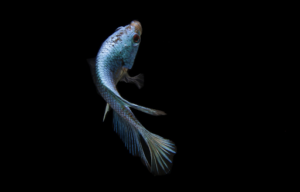
Betta fish, with their stunning colors and unique personalities, has captured the hearts of fish enthusiasts all over the world. They’re loved for their resiliency, but their vibrant charm often comes with a sea of misconceptions. Myths about their habitats, lifespan, dietary habits, and even their temperament have led to misinformation about their proper care.
Some people think Betta fish thrive in tiny spaces, or that they have a short lifespan. Others believe that they can subsist solely on plant roots, or that they are universally aggressive. These myths can lead to improper care and an underestimation of what it truly means to be a responsible Betta fish owner.
However, it’s time to set the record straight. In this comprehensive article, we’ll tackle these widely held misconceptions head-on, debunking each myth with factual, reliable information.
Myth 1: Betta Fish Prefer Small, Confined Spaces
A common misconception you’ll often hear is that Betta fish are perfectly happy in small, confined spaces. This myth probably originates from the way they are displayed in pet stores – typically in tiny containers. But just because they can survive in these conditions, it doesn’t mean they thrive there.
In reality, Betta fish hail from the expansive rice paddies and floodplains of Thailand, where they have ample room to swim. It’s a world far removed from the cramped confines of a small glass bowl or vase. They are active swimmers and explorers who need space to exercise and engage their curiosity.
When we limit them to a tiny tank, we hinder their natural behavior, often leading to stress and a decrease in overall health. An optimal Betta fish tank should be at least 5 gallons, allowing them room for free movement and exploration. It’s also essential to mimic their natural habitat as much as possible, with plenty of hiding spots and vegetation.
Understanding the space requirements of Betta fish is crucial in providing them with an environment in which they can lead healthy, happy lives. Far from loving small spaces, Betta fish flourish when they have room to roam.
Myth 2: Betta Fish are Short-Lived
Another prevalent myth is that Betta fish have a short lifespan. This misunderstanding may stem from poor care conditions, which can dramatically reduce a Betta’s lifespan. However, with proper care, these colorful fish can live a relatively long time.
On average, a healthy Betta fish can live between 3 to 5 years in a well-maintained aquarium. This lifespan can even extend up to 7 years in exceptional circumstances. This is a bit shorter compared to the average lifespan of Neon Tetras, a popular aquarium fish that typically lives between 5 to 10 years under optimal conditions.
Several factors can influence a Tetra fish lifespan. These include a balanced diet, proper tank conditions, regular water changes, and a stress-free environment. Just like any other pet, Betta fish need their owners to provide them with appropriate care for them to live their lives to the fullest.
Myth 3: Betta Fish Can Survive on Plant Roots Alone
Originating from the shallow, slow-moving waters of rice paddies, marshes, and ponds in Southeast Asia, Betta fish have adapted to survive in environments that are often low in food resources. This, however, does not mean that plant roots are sufficient for their nutritional needs.
In fact, Betta fish are primarily insectivores. In the wild, they eat a diet rich in insects and small crustaceans, supplementing their diet with algae and other plant matter when necessary. This means that they need a good amount of protein to stay healthy. A diet based solely on plant roots would lack the essential nutrients, especially proteins, leading to malnutrition over time.
So, what should you feed your Betta fish? A balanced diet should include high-quality Betta pellets that are specially formulated to meet their nutritional needs. Additionally, supplement their diet with live or frozen foods such as brine shrimp, daphnia, or bloodworms. This variety not only ensures your Betta gets all the necessary nutrients but also keeps them mentally stimulated.
Proper feeding practices also involve not overfeeding your Betta, as this can lead to obesity and other health issues. A healthy Betta fish should be fed a small amount of food once or twice a day.
Myth 4: All Betta Fish are Aggressive
One widely held belief is that all Betta fish are inherently aggressive. This belief largely stems from observations of male Betta fish, also known as Siamese fighting fish, who are known to be aggressive towards other males of their species. However, it’s essential to understand that this aggressive behavior doesn’t represent all Betta fish.
While it’s true that male Betta fish can be territorial and shouldn’t be housed together, they can coexist peacefully with many other types of fish. Female Betta fish, on the other hand, tend to be less aggressive and can sometimes live together in a group, often called a sorority, provided there’s enough space and hiding spots.
Moreover, Betta fish can show varying personalities. Some may be more aggressive, while others can be relatively peaceful. Their behavior can also be influenced by their environment. Stressful conditions can induce aggressive behavior, while a comfortable, well-maintained tank can lead to more peaceful interactions.
Myth 5: Betta Fish Don’t Need Filtered Water
Betta fish are often believed to be so hardy that they don’t require filtered water. This myth is based on the fact that Betta fish can breathe atmospheric air due to a unique labyrinth organ. While it’s true that this allows them to survive in low-oxygen environments, it doesn’t mean they can thrive in unfiltered water.
Like any other fish, Betta fish produce waste that accumulates in the tank, leading to higher levels of ammonia and other harmful substances. Over time, these toxins can harm the fish and lead to a range of health problems, including decreased appetite, lethargy, and even premature death.
A good filter not only keeps the water clean but can also conserve water, a key aspect of green pet care. It will help remove these toxins and keep the water clean and safe for your Betta. Moreover, filters also aid in water movement, mimicking the slow-moving currents that Betta fish naturally live in.
Conclusion

Myths can often blur the lines of reality, especially when it comes to caring for Betta fish. It’s crucial to understand these beautiful creatures’ actual needs, rather than relying on misconceptions.
Betta fish are not just about survival; they can truly thrive with the right care. By embracing the truths over myths, we can provide a healthier, happier life for these stunning pets.










